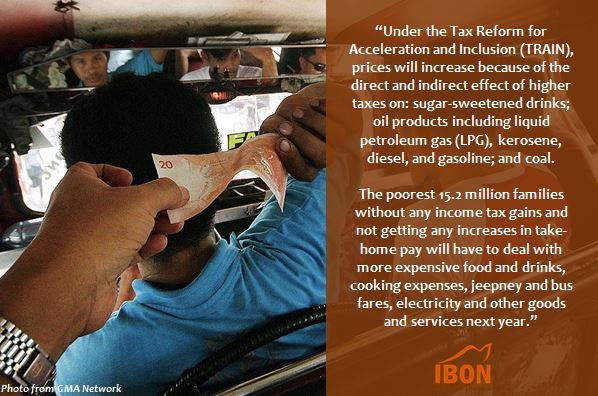Research group IBON said that contrary to its claims, the Duterte administration affirmed its apathy towards the low-income majority of Filipinos upon its signing of the Tax Reform for Acceleration and Inclusion (TRAIN). By signing the tax program into law, government has proven its determination to collect funds for its purportedly pro-poor centerpiece programs but at the expense of millions of poor Filipinos who will have to cope with TRAIN-triggered price hikes, said the group.
President Duterte, upon inking TRAIN, said that it would be his administration’s best Christmas gift to the Filipino people. Following deliberations on proposed amendments to the Department of Finance’s (DOF) original package, Congress ratified last week a final version of the first package of the government’s Comprehensive Tax Reform Program (CTRP).
According to IBON, government has in fact grossly exaggerated how lower income taxes will benefit Filipinos, and downplayed how the country’s poorest will be burdened by higher prices on basic goods and services without getting any tax exemptions. The overwhelming majority of Filipinos in fact do not get any income tax benefits from TRAIN, the group said.
“TRAIN is a scourge, not a gift, to the people,” IBON executive director Sonny Africa said. “Though Filipino families certainly deserve income tax cuts to cope with rising costs of living, it is misleading to claim ‘6.8 million’ benefiting from TRAIN because this figure includes millions of minimum wage earners already exempted by law,” said Africa. He added that if anything, the DOF, House and Senate have even proposed to remove this minimum wage exemption.
Africa also said that 15.2 million Filipino families not getting any increases in take-home pay will have to deal with more expensive food and drinks, cooking expenses, jeepney and bus fares, electricity and other goods and services next year. Higher taxes will be imposed on sugar sweetened drinks; oil products including liquid petroleum gas (LPG), kerosene, diesel, and gasoline among others; and coal. Broadening the VAT base will only worsen the burden on poor Filipinos, Africa said.
Africa also noted that the biggest chunks of flagship infrastructure projects for which the administration claims to have earmarked most of the collection from TRAIN are concentrated in already economically-active regions such as the Metro Manila, Southern Tagalog and Central Luzon. That the poorest regions like the Autonomous Region of Muslim Mindanao (ARMM) and Caraga Administrative Region (CAR) are getting only small portions of the Build Build Build projects indicates that the Duterte administration marginalizes poor Filipinos, said Africa. The projected cost of Build Build Build is at Php8-9 trillion over five years with projects to involve China and Japan, as well as known oligarchs such as the Ayalas, Cojuangco and the Pangilinan group.



